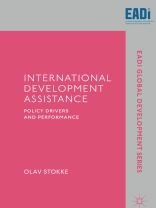This book provides a comprehensive search for the basic political drivers of international development cooperation, based on the policy and performance of the OECD countries from the early 1960s to the present. The author focuses on the stated and implemented policies of the four so-called frontrunners and the Western hegemon, scrutinizing the changing trends in the justifications, objectives and guidelines set for the policy and their evolving performance vis-à-vis the international ODA target. Through extensive research, the work examines predominant world-views, societal value systems and foreign policy traditions, in order to find the policy drivers that vary nation to nation and how development assistance has evolved globally.
Table des matières
Part I Searching for the Policy Drivers of ODA.- 1. Introduction.- Part II International ODA Targets, Their Follow-Up and Real Value to Recipients.- 2. The Evolving International Volume Targets.- 3. The Follow-Up on the 0.7% Target: A Bird’s-Eye Perspective.- 4. What is the Real Value of ODA to Recipients?.- Part III ODA Targets and Policy Determinants: the Frontrunners and the Western Hegemon 5. Denmark: The Pragmatic Frontrunner.- 6. Norway: Altruism under Strain.- 7. Sweden: Combining Domestic Values with Neutralism.- 8. The Netherlands: Merchant and Clergyman.- 9. The United States: The Realist.- Part IV Analysis and Conclusions.- 10. The Drivers of ODA: What Can They Tell About Its Future?.
A propos de l’auteur
Olav Stokke is Senior Researcher at the Norwegian Institute of International Affairs, Norway. He is the author of The UN and Development (2009).












